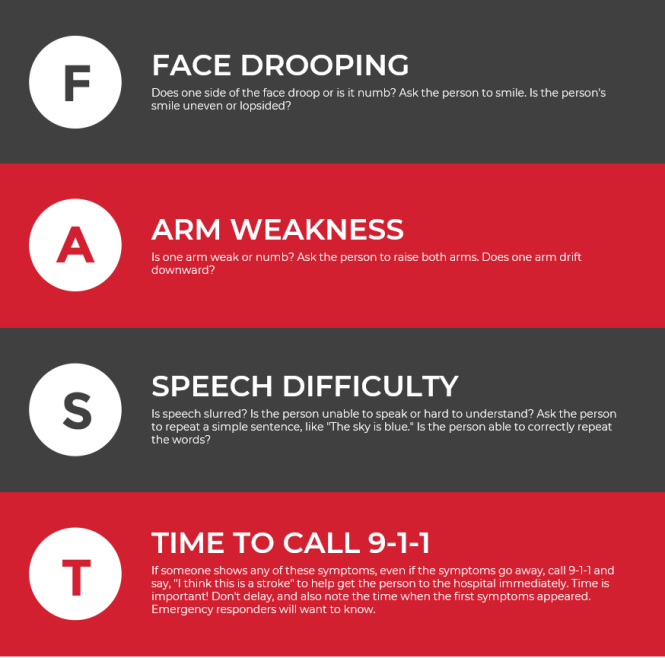The global number of stroke deaths will climb 50% come 2050, a new report says, an increase that shows sharp differences based on national income. Huge gaps exist in the prevention and treatment of the condition, particularly in low- and middle-income countries, reflecting a recent WHO report’s conclusion that high blood pressure, a key risk factor for strokes, is not adequately treated worldwide.
University of Delaware Studies
- Aphasia – Have you had a stroke and have trouble speaking and/or communicating?
Researchers at UD are looking for people with Aphasia for a study about participation in life.
Check out the flyer – here. - Neurological Conditions – Do you have a neurological condition? UD Researchers are looking for people with aphasia, Parkinson’s, and more for a study.
Check out the flyer – here.
Living Well After a Stroke
Christiana Care Hospital – John H. Ammon Medical Education Center
Tuesday, April 16, 2019
6:00 – 7:30 pm
Recovering from a stroke takes time and rehabilitation is an important part of that recovery.
Join the Christiana Care’s Center for Rehabilitation team for “Living Well after Stroke,” a talk on the importance of rehabilitation after a stroke and reducing the risk factors for another stroke.
The Rehabilitation team
will introduce stroke survivors and their care partners to the many approaches
and steps to recovery and prevention along with the roles of the therapists in
your journey from first steps to living life to the fullest.
An audience Q&A will follow.
Speakers:
· Courtney Nice, PT, DPT, NCS
· Megan Ramage, OT
· Phillip Doucette, MM MA CCC-SLP
· Ronald Dohanish, PA-C – Physical Medicine and Rehabilitation
To register call 800-693-CARE (2273)
April Stroke Support Group
Our April Support Group meeting will be held on Thursday, April 4, 2019 in Christiana Hospital, room 1100.
4:00 – 5:30 pm
Speaker/Topic: Marianne Wolsee | Chair and Adapted Exercises
April Aphasia Education Group
Have you been affected by aphasia and the ability to communicate? Come join us for discussion about aphasia and an opportunity to meet other people/caregivers who have been affected by aphasia!
Wednesday, April 3
10:00 – 11:00 am
Location: Christiana Hospital, Room 1000
Topic: Tips for talking to medical professionals when you have aphasia
Contact Mindy Myers, MA, CCC-SLP (mmyers@christianacare.org)
Stroke Support Group Meetings
-
Stroke Education & Support Group
Third Friday of Every Month, 12 – 1 p.m.
Next Meeting: Nov. 16
Christiana Care Rehabilitation ServicesStroke survivors, their caregivers, family, friends and medical professionals are invited to attend our monthly meetings. At some meetings, outside speakers will focus on related health care topics and other important issues. At other meetings, a general support group is held.
-
Stroke Education & Support Group
First Thursday of Every Month, 4 – 5:30 p.m.
Next Meeting: Nov. 1
Christiana Hospital campusStroke survivors, their caregivers, family and friends are invited to attend our monthly meetings – a place where we gather to connect, share experiences, receive information and learn in a caring atmosphere.
-
Aphasia Education Group
First Wednesday of Every Month, 10 – 11 a.m.
Next Meeting: Nov. 7
Christiana Hospital campusAphasia is an acquired language disorder that can happen as a result of stroke or brain injury. We offer a support group for those affected by aphasia.
-
Rehabilitation Services Lecture Series
Tuesday, Nov. 13, 6 – 7 p.m.Christiana Hospital campus
“Stopping Foot Pain In Its Tracks.”Join us for a series of six lectures in our 2018 Rehabilitation Lecture Series. To learn more call 800-693-CARE (2273).
F.A.S.T – Signs of a Stroke
For more information about F.A.S.T, head over to our Videos page.
Kate W. Smith, MD, MPH to attend American Heart Association Ten-Day Seminar
Academy/DPHA program manager, Kate Smith, MD, MPH has been accepted to attend the AHA/ASA Ten-day Seminar on the Epidemiology and Prevention of Cardiovascular Disease and Stroke.
The Ten Day Seminar is a unique program for physicians, researchers, public health practitioners, nurses, and other health care professionals designed to provide training in new areas of investigation and application of new methods related to the promotion of cardiovascular health and prevention of heart disease and stroke, including descriptive epidemiology, quality of care and outcomes research, genetic epidemiology, policy, and environmental approaches to health.
The overall goal of the conference is to enhance the ability of participants to pursue successful careers related to the epidemiology and prevention of heart disease and stroke, and the promotion of cardiovascular health through development of competencies related to grant writing, manuscript development, teaching, and clinical and public health practice. A select faculty of epidemiologists, biostatisticians and prevention researchers will use interactive learning techniques; including lectures, small group discussions, and tutorial sessions illustrating basic principles of cardiovascular disease and stroke epidemiology, and prevention, and their applications. There will be extensive group participation.
Read more about this, and other AHA/ASA professional education programming here:
https://professional.heart.org/professional/index.jsp
Our investment in this unique, curated, intensive seminar underscores the importance we place on this public health issue.
Welcome to the Delaware Stroke Resources program.
According to the American College of Cardiology 2017 Update:
Stroke accounts for 1 of 20 deaths in the US. Approximately every 40 seconds, someone experiences a stroke in the US. Death rates due to stroke have declined. As adults with stroke survive, stroke has become the leading cause of long-term disability in the US.
The Delaware Academy of Medicine / Delaware Public Health Association has been a strong supporter of stroke research, education, and awareness since 2012, and we are continuing this tradition through this website and continuing lay and professional education.
